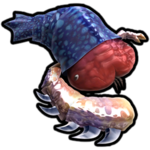Creep-crab family: Difference between revisions
(The plural of "genus" is genera. And actually, yes two species can have the same species name. But those are rare cases and those are often in completely different classes. I can't think of any examples off the top of my head, but there are some on Wikipedia probably.) Tag: Mobile edit |
m (Added German name + added explanation) |
||
| Line 39: | Line 39: | ||
|SpaA= Rastrerópodos | |SpaA= Rastrerópodos | ||
|SpaAM= From "rastrero" (creeping) and "isópodos" (isopods) | |SpaAM= From "rastrero" (creeping) and "isópodos" (isopods) | ||
|Ger= Kriechkrabbe | |||
|GerM= Creep crab | |||
|Ita=Gran-granchi | |Ita=Gran-granchi | ||
|ItaM=Big crabs | |ItaM=Big crabs | ||
Revision as of 10:23, February 25, 2024
The creep-crab family is a family of creatures in Pikmin 2 and Hey! Pikmin. Members of this family resemble crustaceans, and have hard shells that cannot be damaged, forcing the player to expose weak points.
This family consists of two similarily sounding genera, Parastacoidea, which the Segmented Crawbster is in, and Tegoparastacoidea, which the Armurk is in. However, both have the same species name, reptantia. This is fixed in the European version of Hey! Pikmin, which gives the Armurk a completely different scientific name.
Members
Segmented Crawbster
- Main article: Segmented Crawbster.
Scientific name: Parastacoidea reptantia
The Segmented Crawbster is a boss in Pikmin 2, found exclusively on the tenth sublevel of the Cavern of Chaos. It attacks by curling into a ball and chasing after its prey in an attempt to crush them. If it hits a wall, it becomes temporarily incapacitated and exposes its only weak point: its soft underbelly. When agitated, it can use its massive claw arm to swipe away Pikmin. After the boss is defeated, it drops the Silencer.
Armurk
- Main article: Armurk.
Scientific name: Tegoparastacoidea reptantia/Scalobita rotunda
The Armurk is the boss of Sparkling Labyrinth in Hey! Pikmin. It resembles a horseshoe crab, with a gray striped shell and many green, jellylike feet. It has two weak points, one on its tail, and the other being its underbelly, both of which are bright pink.
It attacks by backing Olimar and his Pikmin against a wall, where it will attempt to lean back and crush them. However, this exposes its belly, allowing it to be attacked. After taking enough hits on its belly, it will turn around and retreat, allowing Olimar to attack its tail. It can also climb onto the ceiling, where it will drop down, curl into a ball, and bounce around the room. It drops the Royal Suite after being defeated.
Naming
The family name consists of the words "creep" and "crab". While "crab" refers to how the members of this family are crab-like, the term "creep" here could either refer to their unsettling nature, or to the way they roll being related to railway adhesion creep.
The genus Parastacoidea is the same word as a real world superfamily that includes species of freshwater crayfish. The genus Tegoparastacoidea is a combination of "parastacoidea" and "tego", the Latin word for "cover".
Names in other languages
| Language | Name | Meaning |
|---|---|---|
| コロガリムシ科? Korogari mushi ka |
Rolling bug family | |
| Kriechkrabbe | Creep crab | |
| Gran-granchi | Big crabs | |
| 데굴데굴벌레 과 | ||
| Rastrerópodos | From "rastrero" (creeping) and "isópodos" (isopods) |

